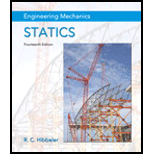
Concept explainers
Determine the largest angle θ that will cause the wedge to be self-locking regardless of the magnitude of horizontal force P applied to the blocks. The coefficient of static friction between the wedge and the blocks is, μs = 0.3. Neglect the weight of the wedge.

Learn your wayIncludes step-by-step video

Chapter 8 Solutions
INTERNATIONAL EDITION---Engineering Mechanics: Statics, 14th edition (SI unit)
Additional Engineering Textbook Solutions
Starting Out with Java: From Control Structures through Data Structures (4th Edition) (What's New in Computer Science)
Java: An Introduction to Problem Solving and Programming (8th Edition)
Starting Out with C++ from Control Structures to Objects (9th Edition)
Introduction To Programming Using Visual Basic (11th Edition)
Computer Science: An Overview (13th Edition) (What's New in Computer Science)
Mechanics of Materials (10th Edition)
- Consider a single crystal of silver oriented such that a tensile stress is applied along a [112] direction. If slip occurs on a (011) plane and in a [111] direction and is initiated at an applied tensile stress of 15.9 MPa, compute the critical resolved shear stress.arrow_forwardA hypothetical component must not fail when a tensile stress of 15.25 MPa is applied. Determine the maximum allowable internal crack length if the surface energy of the component is 1.50 J/m2. Assume a modulus of elasticity of 350 GPa.arrow_forwardFresh air at 21.1 C in which partial pressure of water vapor is 0.018 atmosphere is blown at the rate of 214 m3/h first through a preheater and then adiabatically saturated in spray chambers to 100% saturation and again reheated this reheated air has humidity of 0.024 kg water vapor per kg dry air. It is assumed that the fresh air and the air leaving the re-heater have the same percentage humidity. Determine:- a- The temperature of preheater, spray-chamber and re-heater b- Heat requirement for preheating and re-heating 11:39 مarrow_forward
- Example(3): 0.15 kg/s steam at atmospheric pressure and superheated to 400 K is bled into an air stream at 320 K and 20 per cent relative humidity. What is the temperature, enthalpy, and relative humidity of the mixed stream if the air is flowing at 5 kg/ s? How much steam would be required to provide an exit temperature of 330 K and what would be the humidity of this mixture? 11:39 مarrow_forwardThe answer to the problem is 31.3rad/s. Please show me how to get the final answerarrow_forwardThe answer to the problem is 1.00 m/s^2. Please show me how to get the final answerarrow_forward
- The answer to the problem is 0.30. Please show me how to get the final answerarrow_forwardThe answer to the problem is 1.96 m/s. Please show me how to get the final answerarrow_forwardA cylindrical tank of diameter D is currently filled with water to a height h, as shown in the figure to the right. Water enters the tank through the pipe at (1) with a cross-sectional area A₁ and a uniform velocity V₁. The height of water in the tank is increasing at a constant rate of 5 mm/s. Given the parameters below, find the volumetric flow rate in the pipe at (2), V2, in cm³/s, and classify it as an inflow or outflow. D = 20 cm h = 0.5 m A₁ = 1 cm² V₁ = 0.1 m/s h 1 V₁ D Pwater = 1,000 kg/m³ V2 2arrow_forward
 International Edition---engineering Mechanics: St...Mechanical EngineeringISBN:9781305501607Author:Andrew Pytel And Jaan KiusalaasPublisher:CENGAGE L
International Edition---engineering Mechanics: St...Mechanical EngineeringISBN:9781305501607Author:Andrew Pytel And Jaan KiusalaasPublisher:CENGAGE L
